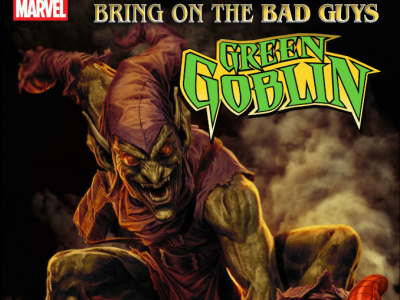 Confessions of a Comic Book Guy is a weekly column by Steve Bennett of Super-Fly Comics and Games in Yellow Springs, Ohio. This week, Bennett looks at how 9/11 and a new approach to heroes are influencing tentpole movies.
Confessions of a Comic Book Guy is a weekly column by Steve Bennett of Super-Fly Comics and Games in Yellow Springs, Ohio. This week, Bennett looks at how 9/11 and a new approach to heroes are influencing tentpole movies. I hadn't forgotten about Comic-Con, honest, but seeing a how it's been covered from every conceivable angle I'll just say, wow, there were a lot of announcements that took me by surprise. Like the return of Little Nemo In Wonderland written by Eric Shanower. His Oz adaptations for Marvel always make my Top 5 Comics of the Year list so this can only be really, really good.
Speaking of Marvel the only thing less likely than the return of Marvel UK would be the return of the Ultraverse. I was hardly a fan but I've got to admit I'm curious to see if anyone can do anything remotely interesting with characters like Motormouth and Killpower. But the one thing I really don't want to see is a Simpsons and Family Guy crossover. The major stumbling block I see for this project is The Simpsons features (essentially) good but flawed people while the entire cast of Family Guy are sociopathic monsters. Don't turn your back on that baby, Marge…
But this column is mostly about old business. I know it will seem like an all too convenient coincidence but I swear, the last time I was at Super-Fly Comics & Games I found owner Tony Barry contemplating a stack of DC's 9-11 benefit books, 9-11: The World's Finest Comic Book Writers & Artists and Tell Stories to Remember, Volume Two. While both were well done and intended we agreed they were essentially unsellable, which I suggested was at least partially due to the fact that even a decade later Americans still had trouble dealing with 9/11. Which oddly enough led to yet another conversation about the movie Man of Steel.
Star Trek: Into Darkness, The Avengers, Iron Man 3 and Man of Steel have all been criticized for their "exploitative use of 9-11 imagery." In his New York Times review Manohla Dargis used Iron Man 3 as an example of "just how thoroughly Sept. 11 and its aftermath have been colonized by the movies." Very much against my will I found myself embroiled in an extremely heated "discussion" of the subject after seeing Star Trek: Into Darkness. One of the people I saw it with felt particularly provoked by all of the disaster and zombie movies which preceded it (though I’m guessing the scenes of bodies falling out of buildings in ST:ID didn't help matters).
I would like to suggest this reaction to what's been dubbed "annihilation porn" has less to do with the supposed crassness of moviemakers and more to do with the fact that we continue to flinch every time we're reminded of September 11, 2001. Which I at least partially blame on the almost immediate unofficial moratorium on showing the video of the attack on the South Tower; given the insatiable demands of the cable news cycle this was probably a good thing. But this willful avoidance has hardened into a reflexive hypersensitivity, an assumption that it shouldn’t be seen. And because the wound hasn't had a chance to heal even the 10th Anniversary of 9/11 seemed strangely perfunctory, as if even ten years later was still "too soon;" maybe that’s why there’s been so little coverage of the completion of the new One World Trade Center.
I could be wrong, I frequently am, but that's what I think anyway.
If this summer has taught us anything hopefully it's that we can no longer automatically assume comic book heroes are good role models. Yes, Superman and The Lone Ranger were once figures that kids looked up to and tried to emulate, at least we like to think so. I'm more than willing to believe this is just nostalgic propaganda and all that moral instruction stuff was just cover to keep the authorities off the broadcasters’ backs while they used the kids to build their brands (a.k.a. make money). And all the kids wanted was the licensed merch. I'm thinking specifically of the 1987 Woody Allen movie Radio Days where the boy Joe wants a Masked Avenger (an obvious Lone Ranger stand-in) decoder ring so badly he’s willing to steal to get it.
But this isn't the case anymore. Nowadays kids' heroes are, well, kids. Characters like Ben 10, Max Steel and Ultimate (a.k.a. Blithering Idiot) Spider-Man aren't supposed to carry any kind of moral authority, they're supposed to behave the way the kids watching the shows wish they could. Meaning any heroic behavior is treated like taking out the garbage, a reluctant chore that gets in the way of their primary occupation, showing off, goofing off, and being super cool awesome all the time.
Screenwriters for these tentpole movies have to somehow make such too-good-to-be-true characters as a perfect man from another planet and a saintly "cowboy"* relatable to a mass audience, which is something of a dilemma when their do-gooding natures make that audience go "Who would do that?" So they make them more like us, which is how we get the reboot James T. Kirk, a brilliant but lazy slacker who is perfectly content to do absolutely nothing until he has to. Make no mistake this chafes me, but since I'm already drifting a little too close to "you kids get off my lawn" territory as it is, I'm prepared to let this one go. And if you plan on living in this century you all might want to adjust your expectations accordingly.
* Even now I continue to see reviews and reports on The Lone Ranger movie which refer to The Lone Ranger as a "cowboy," which I believe is a demonstration of the vastness of the disconnect between the character and today's audience. He may well have ridden a horse, used six-shooters, operated in the Old West and, yes, wore a cowboy hat, but none of this makes him in any way a "cowboy." Rather he was, in the words of an author whose name I wish I could remember, "the embodiment of an answered prayer."
The opinions expressed in this column are solely those of the writer, and do not necessarily reflect the views of the editorial staff of ICv2.com.







